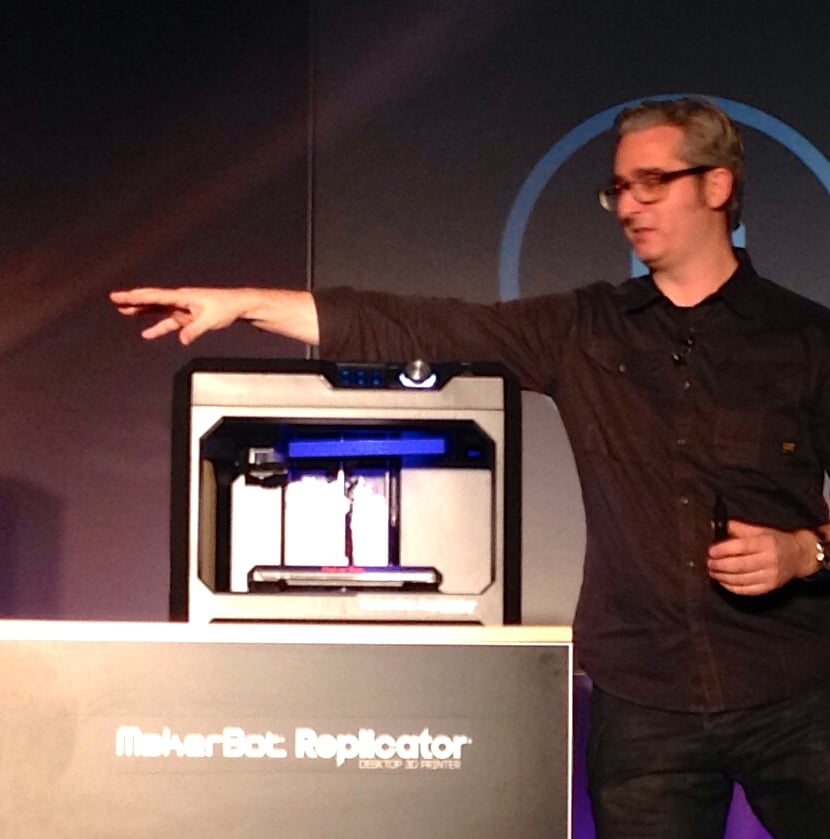
A very excited MakerBot CEO Bre Pettis took the stage at a Las Vegas hotel yesterday and presented what must have been MakerBot’s most profound – and certainly biggest – set of product announcements in its history. Not one, not two, but three new 3D printers were announced, along with a series of related software, services and initiatives. Pettis said they were “years in the making”, and we don’t doubt it.
But let’s get down the announcements. While each of the items below warrants a post of its own, today we’re simply providing an overview. More thoughts to come when we get a closer look at the machines this week at CES.
The MakerBot Replicator Mini: It’s now the smallest 3D printer in MakerBot’s line, but it’s size is reminiscent of the original MakerBot CupCake (which we still have in the Fabbaloo lab, BTW!) Unlike the CupCake, however, the Mini is designed for those new to 3D printing. Pettis explained their goal was a “point and shoot experience”. In fact, the Mini is said to provide “One-Touch 3D printing” – which had a visible trademark symbol beside it. The Mini will be shipped in the spring at a cost of USD$1,375 each.
The MakerBot Replicator: The successor to the Replicator 2/2X turns out not to be the “Replicator 3”, but is instead simply called the “MakerBot Replicator”. Evidently MakerBot is taking a cue from Apple, who now update their machines without regard to numbering. The new Replicator has an 11% larger build volume and other improvements that we’ll mention below. It is for sale immediately, ships in “a couple of weeks” according to Pettis and is priced at USD$2,899.
The MakerBot Replicator Z18 was perhaps the biggest surprise. It’s simply the biggest, period. It’s a gigantic version of a Replicator, with a massive build volume of 12 x 12 x 18 inches (305 x 305 x 457mm), hence its name. This unit also includes the very first feature enabled by the Stratasys merger: a true heated build chamber! The Z18 is the only personal 3D printer to utilize such a feature, at least without patent infringement.
There are several critical implications of the gigantic Z18 that we’ll investigate in the near future. The Z18 will be for sale this spring, priced at a whopping USD$6,499.
In spite of three new 3D printers, MakerBot will continue to sell the Replicator 2 and Replicator 2X.
You might be wondering why we’re not mentioning the specs for each machine. There’s a good reason for that: aside from the build volume, ALL of these machines include basically the same new features:
- Smart Extruder. An easy-to-load extruder that you can lift out for easy access; it’s attached by magnets.
- Embedded Camera: Incredibly, ALL of these machines includes a camera capable of showing you in real-time the status of your print job!
- Networking: All machines include WiFi as well as USB access, which makes the camera more useful, obviously, as you can now remotely watch print progress. The Z18 also includes an Ethernet plug for office networking.
- Automatic Notifications and Pausing: All machines can notify you electronically of print completion – and can also automatically pause the print if you’ve run out of filament. You can then refill the spool and continue.
- Simplified Bed Leveling: While the Mini is said to require “No Leveling”, the other machines include an “assisted build plate leveling” feature. In other words, “turn the knob until the light comes on.” Sounds pretty straightforward to us.
- LCD Display Panel: The Z18 and new Replicator both include a very crisp and large LCD panel that displays pertinent information about the current print job. They also include a rather slick scroll knob for selecting options, which appeared to us very similar to the Nest thermostat, although Pettis claims it was inspired by high-end audio equipment.
- PLA Capability: No mention of ABS plastic here. It appears that the new machines are all optimized for PLA printing only.
Whew! And there’s more.
MakerBot also announced significant improvements to their software, including:
- A new MakerBot Desktop application, that integrates the previous MakerWare, connects with Thingiverse and provides a single online cloud platform for your designs, as well as monitoring progress of print jobs. Note: this software works for ALL previous MakerBot 3D printers, except the original CupCake, which apparently could not be accomplished, according to Pettis.
- A mobile app that can monitor and control your MakerBot printers.
- A creation tool, MakerBot Printshop, that enables simplified creation of bracelets and type-based objects.
- A Digital Store, where custom 3D models made in-house by MakerBot designers are sold at prices as low as USD$0.99 each. These 3D models are specifically designed for successful 3D printing: no supports are required, no glue is ever required (snap fit for multi-part items) and from the looks of the sample we inspected, they can be printed hollow as well to save plastic. Currently six model collections are available.
We’re going to take a few days to digest all of this, as these announcements could be the most significant in personal 3D printing history. These announcements change the game for everyone. Stay tuned for more analysis.
Via MakerBot


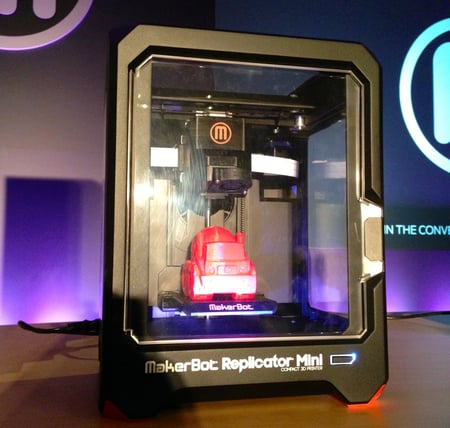
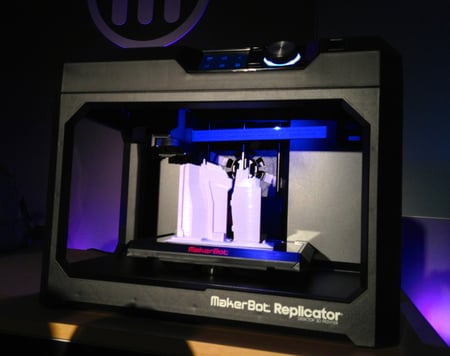
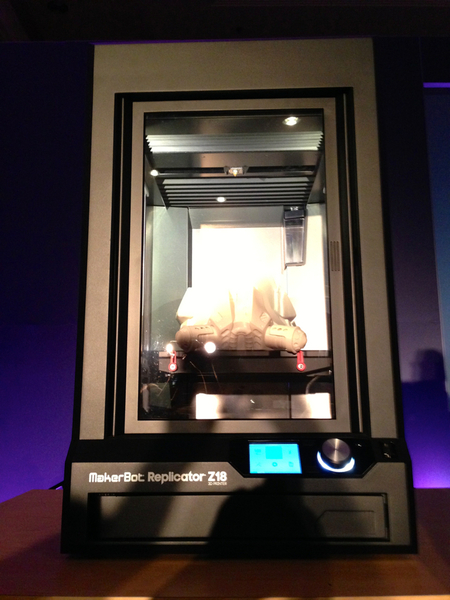
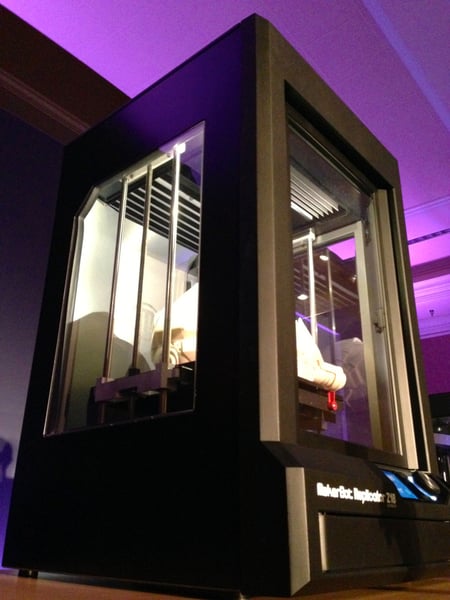
I know a lot more people that object over the price than have bought a Replicator 2.
The total number of Makerbots sold by itself doesn't say much, they've been in business for 5 years, making it an average of less than 10,000 sold a year. They might have sold 20,000 in the last year, but even so, without knowing the size of the market, it's hard to say if that's a lot.
I know a lot more people that object over the price than have bought a Replicator 2.
The total number of Makerbots sold by itself doesn't say much, they've been in business for 5 years, making it an average of less than 10,000 sold a year. They might have sold 20,000 in the last year, but even so, without knowing the size of the market, it's hard to say if that's a lot.
Yes, they are perhaps more expensive than other machines, but we believe MakerBot is attempting to create a unified software/design/printing process, which is part of what you're paying for. We understand that the Rep2/2X will continue to be sold. While some people may have balked at the price, far more actually did buy the device. According to Pettis, there are over 44,000 MakerBots in the world today.
Yes, they are perhaps more expensive than other machines, but we believe MakerBot is attempting to create a unified software/design/printing process, which is part of what you're paying for. We understand that the Rep2/2X will continue to be sold. While some people may have balked at the price, far more actually did buy the device. According to Pettis, there are over 44,000 MakerBots in the world today.
It's nice, "stunning" seems a bit much. The medium and particularly big one seem pretty expensive, especially in the realm of falling 3D printer prices. There's a LOT of people that balked at the $2200 figure for a basic Replicator 2, $2900 isn't going to help. The mini is nice, but the build volume is very tiny, an eighth that of many other machines.
The medium one is replacing Replicator 2 & 2X, costs more than the 2X but goes without the enclosure, second extruder, and I think goes without the heated bed. A camera is nice, but I find a heated bed actually helps make good parts more reliably.
I like the H-bot mechanism.
The filament pockets could preclude third party filaments.
The control interface seems pretty nice.
It's nice, "stunning" seems a bit much. The medium and particularly big one seem pretty expensive, especially in the realm of falling 3D printer prices. There's a LOT of people that balked at the $2200 figure for a basic Replicator 2, $2900 isn't going to help. The mini is nice, but the build volume is very tiny, an eighth that of many other machines.
The medium one is replacing Replicator 2 & 2X, costs more than the 2X but goes without the enclosure, second extruder, and I think goes without the heated bed. A camera is nice, but I find a heated bed actually helps make good parts more reliably.
I like the H-bot mechanism.
The filament pockets could preclude third party filaments.
The control interface seems pretty nice.